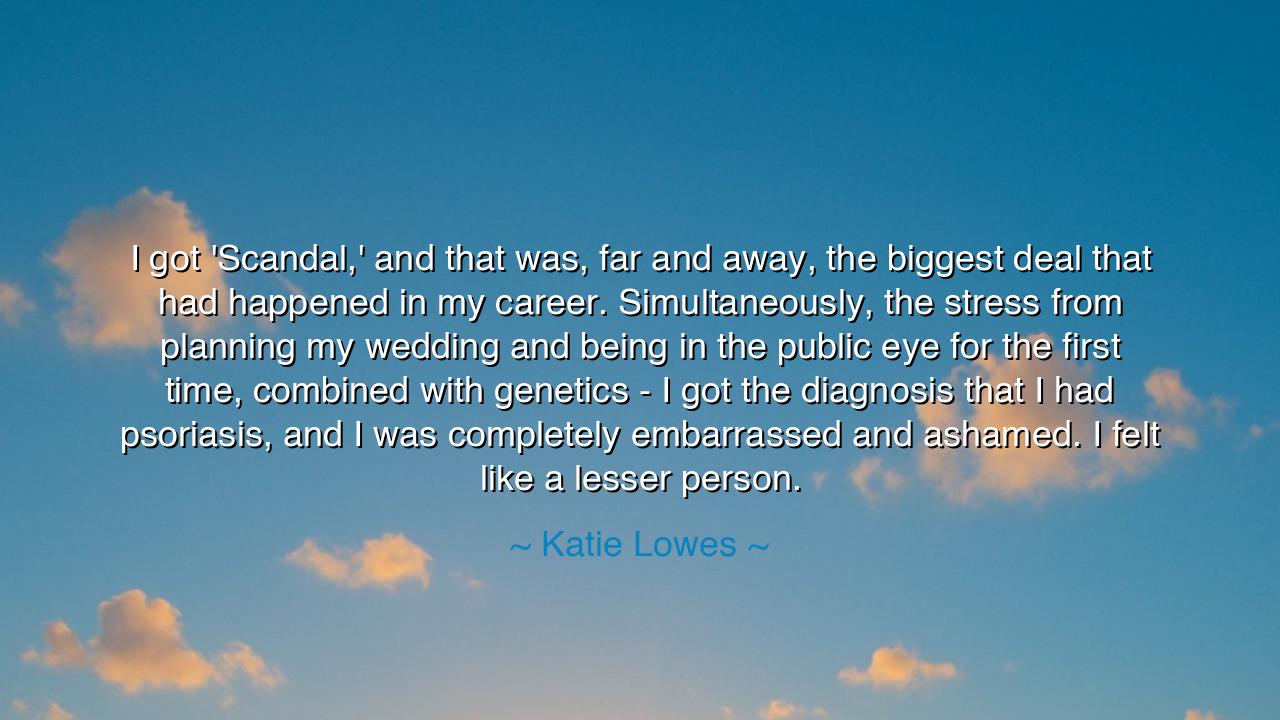
I got 'Scandal,' and that was, far and away, the biggest deal
I got 'Scandal,' and that was, far and away, the biggest deal that had happened in my career. Simultaneously, the stress from planning my wedding and being in the public eye for the first time, combined with genetics - I got the diagnosis that I had psoriasis, and I was completely embarrassed and ashamed. I felt like a lesser person.






In the words of Katie Lowes, we hear the song of triumph shadowed by trial. She recalls the moment she won “Scandal”, the greatest role of her career, a height reached after years of labor. Yet even as glory dawned, storms gathered: the stress of planning her wedding, the sudden weight of being in the public eye, and the cruel inheritance of genetics, which brought upon her psoriasis. What should have been a season of joy became also a season of shame, and she confesses that she felt like a lesser person. In this paradox, we see the eternal truth: that success does not shield us from suffering, and that triumph and pain often walk hand in hand.
The ancients knew this pattern well. Consider Alexander the Great, who conquered empires but carried within him fevers and wounds that humbled his body even as his name echoed across the earth. So too Lowes reveals that while the world may see only the crown, within the soul there may be struggle and sorrow. The lesson is that greatness is not the absence of weakness, but the courage to endure weakness even while walking among the mighty.
Her words also illuminate the burden of appearance in the public realm. To be watched by many eyes magnifies every flaw, every blemish, every scar. What might be borne quietly in private becomes unbearable beneath the gaze of the crowd. Here is a warning to all: that the adoration of the world is never free, for it often demands a price from the heart. Yet even in her confession of embarrassment, there is a quiet heroism, for she names her shame aloud, transforming it from hidden wound into shared truth.
History gives us the reflection of Abraham Lincoln, who bore the weight of a divided nation while haunted by bouts of deep melancholy. Though the world saw a resolute leader, within he battled shadows. Yet his greatness was not diminished by this—rather, it was deepened, for he proved that fragility and strength may coexist. So too, Lowes’ confession shows that even in feeling lesser, the act of enduring, of speaking, of continuing her craft, is itself an act of greatness.
Therefore, let it be taught: the presence of suffering does not nullify the worth of triumph. The wedding may bring stress, the body may betray itself, the gaze of others may wound—but none of this makes a soul lesser. On the contrary, it proves the resilience of the spirit. In Lowes’ words lies a gift to future generations: to know that shame need not silence us, and that even in brokenness, one can stand with dignity. For the true measure of greatness is not in the perfection of the body, but in the courage of the heart that endures.






AAdministratorAdministrator
Welcome, honored guests. Please leave a comment, we will respond soon